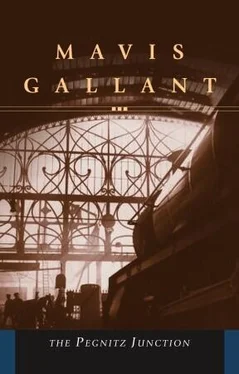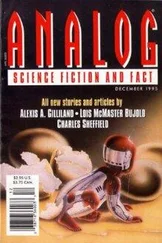I did not meet her children, but I saw her with them in a tearoom: two plump girls of about fourteen, in clay-coloured tights and long pullovers that covered their sturdy hips. They were not girls I had ever seen before. They looked sullen there in the dark shop, which was suffocating with the smell of chocolate. They were choosing éclairs, pointing, discontented and curt. Their school had not yet taught them manners, and their mother, with a stiff smile on her lips and her sunglasses hiding her opinion, could see only the distance between what they were and what they ought to be. She was not an educator. The girls’ clumsiness was a twist of the spirit, a sprain. She watched them choose and eat, and I thought how much time she spent watching people choose and eat their food. She removed the glasses and rubbed the space between her eyes. She saw me, and her glance meeting mine almost begged something. Information? Advice? She had the psychotherapy for advice, and she had Peter to tell her stories. Perhaps she wanted me to change my mind about going with them. He must have asked for me, as he asked for cars she would not let him drive because he broke them.
It would have been easy for her to make me believe my choices were wrong, but it would have been another matter to make me change my mind. Once when she was busy with the twins, he came to me. He looked at the saucer full of moss and Alpine plants; and the shelf with tea and hard biscuits and cereal and powdered milk; and at my bed with its shabby cushions; and my walls decorated with photographs of snow and skiers — searching for something. He twitched a curtain as if it hid a view he liked and said, “It’s all dirty green, like a customs inspector’s uniform.”
But I had travelled nearly as much as Peter, and over some of the same frontiers. He could not impress me. I think (like the remark about semiprecious stones and snow-capped mountains) it was a way of talking he had developed because it amused his wife. He knew it was no good talking about the past, because we were certain to remember it differently. He daren’t be nostalgic about anything, because of his inventions. He would never be certain if the memory he was feeling tender about was true.
I watched him at the window — the town lad, hating the quiet. “What is that racket?” he said angrily. It was the stream running outside through the garden. There was also Coco, the donkey, braying in his enclosure. He would have preferred a deafening, continued, city noise. I remembered him on streets full of trains and traffic; I remembered the quick turn of his head. When I remembered the horror of the room over the café, I thought it had been the horror of living on a street.
The view here, after the long garden, was of the roof of the chalet farther down the slope. A crash: my bookshelf, containing Wild Flowers of Germany , fell from the wall. The house shook.
He looked at the perpendicular, windless rain that had begun to fall. He turned back to the room; he was still searching. “You used to read,” he said, still in pursuit of something. I pointed to the floor. “Didn’t you hear them fall?” He made a silly remark — I remember the sense of it, not the words. He could not trust me, because I had once run away, vanished, but as he had long ago fabricated something else, he could not remember why he could not trust me. The room grew dark. I served coffee in cups with Liberté and Patrie and a green-and-white shield of the Vaud on them. The parents of a pupil had bought them in Montreux for me once. He held his cup close to his eyes and read the words, and put it down without saying anything.
I said to myself that he was only a man about whom I had known a great deal and it was so long ago that much of it might have been told to me by someone else. Nostalgia is a weakness; he would be the one to indulge in it, if he dared. I had not gone to him out of duty and had not left him out of self-preservation. It was not that simple. I would have talked, for I knew he was waiting for me to scrape away the dreams and begin again with the truth, but I thought, I shall write him a letter. That will be easier. I shall write about everything, all of the truth.
They came up by train and they left by train — the little red train that has its start among the hotels and swimming pools along the lake. As neither of them could drive the other, they had to take the train. They were leaving the twins behind. The twins were happy, and the fresh air was doing them good. They were enrolled for the autumn term.
The first-class carriages of those trains look as if they had been built for miniature royal tours. There are oval satinwood panels and Art Nouveau iron roses. Some of the roses had iron worms eating their hearts. I imagine the artist meant something beautiful and did not know it was hideous. As you can imagine, the trains are beautifully polished. The panels gleam, and dust is not allowed to accumulate in the rose petals. The windows are clear for a view of cows and valleys, the ashtrays are emptied and polished, and the floors are swept. I like best the deep-rose velvet, with its pattern of brown leaves and ferns, that covers the seats. It wears slowly; in some very worn places the colour is light apricot and the palest lemon, and the pattern can scarcely be seen. Somewhere in storage, preserved from dust and the weather, are bales of the same velvet, and when a seat becomes too worn they simply patch it up again.
He would have stayed if I had wanted. Yes, Poodlie would have left Poodlie. He knew I would never go with them. I might have been for sale, but not to her. At a word of truth he would have stayed, if only to hear the rest. He would have made furious plans, and left such an imprint on this place that after his departure I could not have lived here any more. Or perhaps this time one of us would have stayed forever. These are the indecisions that rot the fabric, if you let them. The shutter slams to in the wind and sways back; the rain begins to slant as the wind increases. This is the season for mountain storms. The wind rises, the season turns; no autumn is quite like another. The autumn children pour out of the train, and the clouds descend the mountain slopes, and there we are with walls and a ceiling to the village. Here is the pattern on the carpet where he walked, and the cup he drank from. I have learned to be provident. I do not waste a sheet of writing paper, or a postage stamp, or a tear. The stream outside the window, deep with rain, receives rolled in a pellet the letter to Peter. Actually, it is a blank sheet on which I intended to write a long letter about everything — about Véronique. I have wasted the sheet of paper. There has been such a waste of everything; such a waste.
Ernst in Civilian Clothes

Opening a window in Willi’s room to clear the room of cigarette smoke, Ernst observes that the afternoon sky has not changed since he last glanced at it a day or two ago. It is a thick winter blanket, white and grey. Nothing moves. The black cobbles down in the courtyard give up a design of wet light. More light behind the windows now, and the curtains become glassy and clear. The life behind them is implicit in its privacy. Forms are poised at stove and table, before mirrors, insolently unconcerned with Ernst. His neighbours on this court in the rue de Lille in Paris do not care if he peers at them, and he, in turn, may never be openly watched. Nevertheless, he never switches on the table lamp, dim though it is, without fastening Willi’s cretonne curtains together with a safety pin. He feels so conspicuous in his new civilian clothes, idling the whole day, that it would not astonish him if some civic-minded and diligent informer had already been in touch with the police.
Читать дальше













